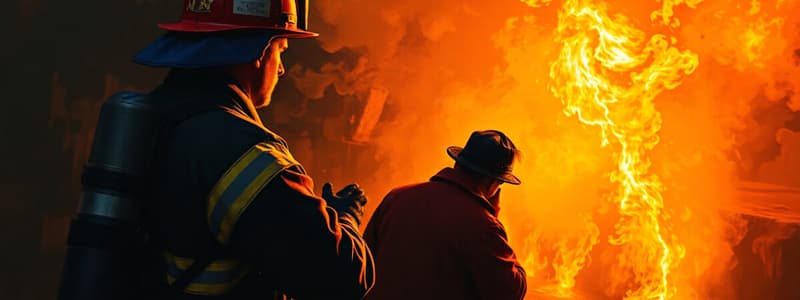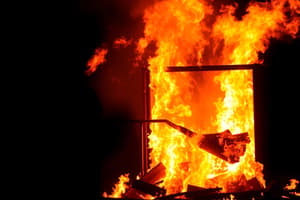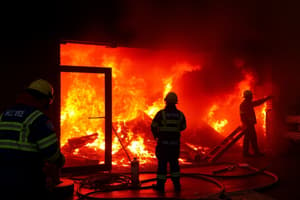Podcast
Questions and Answers
Which factor is primarily influenced by the recognition of different fire scenarios during an investigation?
Which factor is primarily influenced by the recognition of different fire scenarios during an investigation?
- The legal documentation process
- The witness statement collection
- The selection of investigative tools
- The investigator's approach to analysis (correct)
What is the main purpose of detailed documentation in a fire investigation?
What is the main purpose of detailed documentation in a fire investigation?
- To create a narrative for the public
- To support the investigation's findings (correct)
- To comply with legal restrictions
- To prepare for future fire safety training
What unique contribution do expert witnesses provide in fire investigations?
What unique contribution do expert witnesses provide in fire investigations?
- Legal representation for the victims
- Insights based on specialized knowledge (correct)
- Witness statements from bystanders
- Photographic documentation of the incident
Which aspect of reporting is crucial to prevent misunderstandings in a fire investigation?
Which aspect of reporting is crucial to prevent misunderstandings in a fire investigation?
What characterizes different fire types that influences analytical techniques used in investigations?
What characterizes different fire types that influences analytical techniques used in investigations?
What is the primary focus during the initial phase of fire cause and origin investigation?
What is the primary focus during the initial phase of fire cause and origin investigation?
Which aspect is NOT critical when determining the fire's cause and origin?
Which aspect is NOT critical when determining the fire's cause and origin?
In the phase of Fire Cause and Origin Determination, which approach is utilized to assist in locating the ignition source?
In the phase of Fire Cause and Origin Determination, which approach is utilized to assist in locating the ignition source?
What is essential for the documentation of fire cause and origin reports?
What is essential for the documentation of fire cause and origin reports?
Which of the following statements best describes the role of physical evidence in a fire investigation?
Which of the following statements best describes the role of physical evidence in a fire investigation?
What should investigators apply when analyzing potential fire causes?
What should investigators apply when analyzing potential fire causes?
Which method is critical for preserving the evidentiary value during an investigation?
Which method is critical for preserving the evidentiary value during an investigation?
What can be considered as physical evidence during a fire investigation?
What can be considered as physical evidence during a fire investigation?
Flashcards
Phase 1: Recognition and Initial Assessment
Phase 1: Recognition and Initial Assessment
The first stage of a fire cause and origin investigation, where the scene is established for thorough examination. This includes the initial observations and actions taken by first responders.
Phase 2: Fire Cause and Origin Determination
Phase 2: Fire Cause and Origin Determination
This phase focuses on identifying the origin of the fire using physical examination and investigative tools. It involves analyzing physical evidence to determine the source of the fire and how it was started.
Phase 3: Development of Conclusions and Reporting
Phase 3: Development of Conclusions and Reporting
The final stage of a fire cause and origin investigation, where all gathered evidence is carefully examined and analyzed to form a comprehensive conclusion about the cause and origin of the fire.
Pattern Analysis
Pattern Analysis
Signup and view all the flashcards
Process of Elimination
Process of Elimination
Signup and view all the flashcards
Physical Evidence
Physical Evidence
Signup and view all the flashcards
Documentation
Documentation
Signup and view all the flashcards
Understanding Fire and Combustion
Understanding Fire and Combustion
Signup and view all the flashcards
Fire Type Characteristics
Fire Type Characteristics
Signup and view all the flashcards
Fire Type Impact on Investigation
Fire Type Impact on Investigation
Signup and view all the flashcards
Documentation Importance
Documentation Importance
Signup and view all the flashcards
Role of Expert Witnesses
Role of Expert Witnesses
Signup and view all the flashcards
Legal Compliance
Legal Compliance
Signup and view all the flashcards
Study Notes
Introduction to Chapter 6: Fire Cause and Origin Investigation
- Chapter 6 of NFPA 921 details the systematic process of fire cause and origin investigation, encompassing both initial recognition of the fire's origin and documentation of the investigation's findings.
Phase 1: Recognition and Initial Assessment
- This initial phase establishes the scene for thorough examination.
- First responder observations and actions are critical to the investigation.
- Critical areas include the fire's origin location and spread pattern.
Phase 2: Fire Cause and Origin Determination
- This phase heavily relies on physical examination and investigative tools.
- Identifying the fire's origin point is crucial.
- Physical evidence, in the context of the scene's facts, is considered.
- Evidence collection and examination reveals the ignition's source and nature.
Phase 3: Development of Conclusions and Reporting
- This concluding phase involves analyzing all gathered evidence to form a safe, accurate cause and origin conclusion.
- Fire cause and origin reports provide detailed explanations for conclusions.
- These reports must be comprehensive and accessible for incident understanding.
- Documentation (notes, photographs) is essential.
Analytical Considerations
- Understanding fire and combustion mechanisms locates potential ignition sources.
- Fire spread pattern analysis helps determine origin points.
- A logical elimination process reduces potential causes.
- All potential ignition sources are considered, based on evidence and context.
Importance of Evidence
- Identifying physical evidence (visible marks, materials) is paramount.
- Proper documentation preserves evidentiary value and ensures transparency.
- Evidence significance and implications are based on knowledge and best practices.
Considerations for Specific Fire Types
- Recognizing fire types (electrical, flammable liquids) influences investigator approach.
- Different fire types have unique development and propagation characteristics.
- Understanding these characteristics allows for appropriate analytical techniques.
Documentation and Reporting
- Detailed documentation (photos, sketches, witness statements, lab reports) supports findings.
- Adherence to legal requirements and fire investigation regulations is vital.
- Clear and accurate investigative language prevents misunderstandings.
The Role of Expert Witnesses
- Expert witnesses provide insights and critical information.
- Expert witnesses offer professional opinions based on specialized knowledge.
- Expert witnesses may provide evidence regarding fire dynamics, materials science, etc.
Studying That Suits You
Use AI to generate personalized quizzes and flashcards to suit your learning preferences.
Description
This quiz covers Chapter 6 of NFPA 921, focusing on the systematic process for fire cause and origin investigations. It includes the phases of recognition, initial assessment, and determination of the fire's origin and cause. Participants will learn about the essential steps and tools involved in conducting thorough fire investigations.



